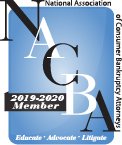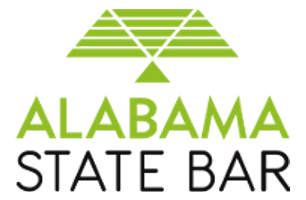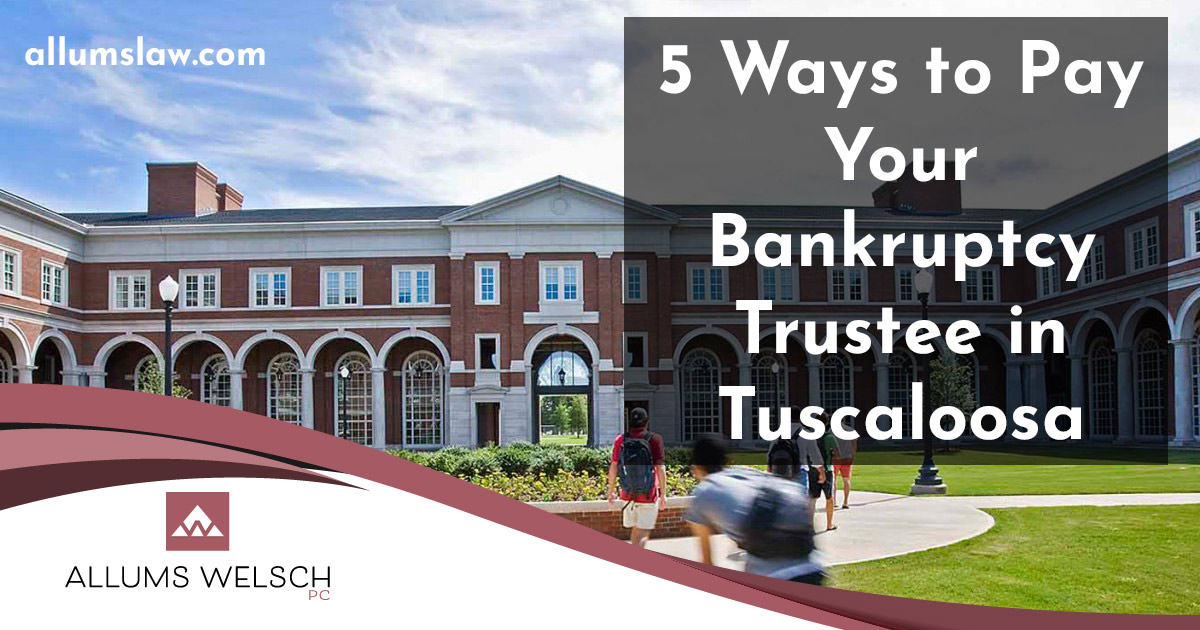Chapter 7 is a liquidation bankruptcy. What that means is discussed in detail below.
The most common reasons for filing Chapter 7 bankruptcy are:
- Divorce;
- Job loss, or wage or overtime reduction;
- Catastrophic health problems (and lack of health insurance).
Divorcing partners, in particular, can quickly encounter hardship when stepping out of a long-term, two-income household into a new single-income reality.
Debt takes a toll on families even when they remain intact. In a divorce, the presence of debt will make a bad situation worse, giving separating spouses one more thing to disagree about.
The responsibility for payment of that debt will need to be resolved in a court-ordered divorce judgment, which can, itself, later complicate a bankruptcy proceeding filed by one of the former partners.
Considering filing for Chapter 7 bankruptcy should not be a source of embarrassment or shame. You cannot budget your way around a health catastrophe, divorce, or job loss that you did not know would occur.
You can file Chapter 7 bankruptcy every 8 years. This 8 year period is calculated from petition date to petition date.
This means that you cannot file a subsequent Chapter 7 if it has not been 8 years + 1 day since the date you filed the prior Chapter 7.
The Automatic Stay
The most immediate benefit of filing for Chapter 7 bankruptcy is the automatic stay.
This is a Federal injunction that is, as it says, automatic.
Once you file your Chapter 7 case, creditors have to stay back. It chills collection efforts, stops collection letters, phone calls, wage garnishments, lawsuits, foreclosures, repossessions, and property seizures to name a few.
The stay on foreclosures and repossessions in a Chapter 7 may only be temporary. If you are behind on your car or house payment when you file Chapter 7, your creditor may ask the Court for permission to resume these collection efforts if you don’t catch up on these payments.
However, in Chapter 7, you are essentially liquidating your assets in exchange for a discharge of your debts.
Chapter 7 bankruptcy allows you to wipe away your unsecured debts and move forward with your life.
First, what are unsecured and secured debts, and what is the difference within the Chapter 7 bankruptcy process?
Secured vs. Unsecured Debts in Chapter 7 Bankruptcy
Unsecured debts are credit card balances, medical bills, personal loans, back rent, and other forms of debt for which you have not pledged any collateral.
The best way to describe what an unsecured debt is, however, by example.
If you purchase groceries and toilet paper from Wal-Mart with a Wal-Mart credit card, the debt you owe on that credit card is unsecured if you do not repay it.
If you don’t pay the Wal-mart credit card bill, what is that credit card company going to do to you?
They’re simply going to call and harass seeking payment for the outstanding bills or they may eventually sue you for the amount owed.
What they will not and cannot do is come to your home and repossess the groceries and toilet paper that you purchased with the credit card.
Secured debts are those for which you put up some asset as collateral for the loan.
For example, if I borrow money from a bank to purchase a home or a car, that bank will require me to sign a contract and pledge my home or car as collateral for my agreement to repay the loan.
If I default on that payment, the bank will either foreclose on the house or repossess the car.
That is a secured debt.
With regard to Chapter 7 bankruptcy, one of the first points of concern for a bankruptcy attorney is to determine how much of a potential client’s debt is secured rather than unsecured.
If all of a person’s debt is unsecured medical debt, Chapter 7 may be an ideal step forward for that person.
On the other hand, if all of a person’s debt is secured, a Chapter 13 bankruptcy may provide a more effective form of debt relief.
For example, if your only major debt problem is that you are 6 months behind in your home mortgage payments, Chapter 7 bankruptcy may only be useful to you if you plan to surrender the home and move out once you discharge your personal obligation to make those payments.
However, if you do want to surrender a home or car that is upside-down or underwater in terms of an arrearage of payments relative to the collateral property’s value, a Chapter 7 bankruptcy is an excellent way to avoid liability for the deficiency balance resulting from a foreclosure or vehicle auction.
What Types of Debt Are Dischargeable in Chapter 7 Bankruptcy?
Most—but not all—unsecured debts are fully dischargeable in Chapter 7 bankruptcy.
Credit card debt, medical bills, and personal loans are dischargeable—unless the debt has been incurred through fraud in some way.
The use of a credit card or any other new debt incurred within just prior to a bankruptcy may be presumed to be fraudulent in some situations.
You will want to discuss any recently incurred or new debt with your bankruptcy attorney at your first appointment.
Federal and Alabama state tax debt may be dischargeable if they meet certain criteria. There are many factors that determine the dischargeability of a tax debt. Discussion of these factors in detail is outside the scope of this post.
You will, again, want to discuss this in detail with an Alabama bankruptcy attorney. It may not be a question resolved at an initial consultation as the attorney may require further IRS documentation to fully analyze your tax debt.
Student loans are, by default, not dischargeable in bankruptcy. However, there are cases in which they can be ordered discharged. This also requires a detailed analysis by an experienced bankruptcy attorney.
The discharge of student loan debt also requires a lawsuit to be filed within your bankruptcy case to obtain that discharge—if it is available.
Court-ordered domestic support obligations arising from a divorce judgment or state court support order may be non-dischargeable in Chapter 7 or Chapter 13 bankruptcy.
Property settlement obligations are sometimes dischargeable—in Chapter 13 bankruptcy.
Again, you will need to discuss any obligations arising from a divorce judgment or state court support order with a bankruptcy attorney at your first meeting.
What Is a Liquidation Bankruptcy?
The assets and property you own or have a claim to will also determine whether or not a Chapter 7 bankruptcy is a better solution than Chapter 13 bankruptcy for you.
Chapter 7 bankruptcy is, as stated, a liquidation bankruptcy.
If you file Chapter 7 bankruptcy owning a lot of assets or with a high-valued claim (such as a personal injury cause of action), you may lose those assets or that claim.
As an example, near our office is a popular mall called the Riverchase Galleria.
That popularity of that mall has raised real estate prices in the surrounding areas. If you owned a 100-acre farm right across the street from the Riverchase Galleria, that farm would be worth quite a lot of money.
If you also had $100,000 in unsecured medical bills, you might be tempted to file for Chapter 7 bankruptcy.
Regardless of owning that farm, a Chapter 7 would indeed wipe out that $100,000 worth of debt without personally paying a penny of it back to the creditor holding that note.
However, you would lose that farm in Alabama.
The farm will be worth well over $100,000. In the Chapter 7, the farm would be seized, forcing you to relocate, and it would be sold.
From the sales proceeds, the Chapter 7 Trustee and the realtor he or she hires to conduct the sale would be paid a commission. The Trustee would pay all of the sales costs and fees from those proceeds. The appraiser and anyone else retained by the Trustee to assist with the sale would be paid. You would receive your homestead exemption if the farm was your homestead.
And, then, finally, the creditor owed the $100,000 would be paid whatever is left over after all of that—up to the $100,000 maximum owed.
If there is anything left after that, presuming you have no other creditors, the Trustee would cut you a check for the remaining balance, whether $20,000 or 20 cents.
Chapter 13 bankruptcy, in which no assets are liquidated, or a non-bankruptcy alternative may be worth discussing instead.
Why do most people pass through Chapter 7 without losing any property?
When Congress implemented the U.S. Bankruptcy Code in its present form, it drafted the statute to allow people to exempt, or remove, certain types of property up to certain value limits from the “bankruptcy estate” created by function of law when the bankruptcy is filed.
The Chapter 7 Trustee assigned to the case is the Trustee of this bankruptcy estate.
If property is exempted up to its full, fair-market value from the estate, the Trustee has no power to seize and liquidate it.
Each state is permitted to draft its own statute listing out what types of property can be exempted and in what dollar-value amount.
Some states just use the Federal exemptions listed in the Bankruptcy Code. However, Alabama is an opt out state and has chosen to use its state exemptions.
With regard to your home, the Alabama state bankruptcy homestead exemption allows you to protect $15,500 in equity, or $31,000 if the bankruptcy is filed jointly by a married couple with joint ownership in the home. Currently these exemptions increase every three years and is slated to increase again on April 1, 2021.
Equity is the cash value of your home that you would pocket if you sold the home and used the proceeds to pay off any mortgage on the home.
Thus, a home worth $100,000 with a $75,000 mortgage has equity of $25,000 (or slightly less, after accounting for the costs of a sale).
That home could be fully exempted in a Chapter 7 bankruptcy if it were jointly owned by a married couple filing the bankruptcy together in Alabama.
To fully understand what you, personally, can or cannot protect in a Chapter 7 bankruptcy, it is essential that you meet with and discuss your potential filing with an experienced Alabama bankruptcy attorney.
Why Does a Bankruptcy Attorney Ask So Many Questions?
Once you decide to file a Chapter 7 bankruptcy and meet with a lawyer, it’s very important to disclose all of your assets for the reasons described above.
When a bankruptcy lawyer is preparing a petition for you, they are going to be listing in this petition all of your assets.
Generally, we don’t go to jail for not paying our debts (with exceptions). Completing a bankruptcy petition improperly or deceitfully can convert a simple credit card into a debt for which you can go to jail.
When you fill out your bankruptcy petition and you sign it, you’re signing it under the penalty of perjury, subject to an allegation of having committed the Federal crime of Bankruptcy Fraud.
You don’t want the FBI knocking on your door because you’ve committed felony perjury.
Additionally, lawyers don’t like surprises.
When you file a Chapter 7 bankruptcy, the Chapter 7 Trustee will conduct an asset search. Trustees are very good at finding assets, certainly better at it than you are at hiding them.
The Trustee may review years’ worth of your tax filings, many months’ worth of bank statements, and they will review land title records and vehicle title records of all sorts.
It is vital that you disclose everything to your lawyer if you’re contemplating filing Chapter 7 bankruptcy.
Income Eligibility for Chapter 7 Bankruptcy
Household income is also a key consideration in the question of whether or not to file for Chapter 7 bankruptcy.
In 2005, Congress created a so-called “Means Test” which now determines whether or not you earn too much money to be allowed to file for Chapter 7 bankruptcy at all.
The Means Test is a 6-month retroactive look-back at your income. It computes your annual household income from the gross income earned by all wage-earners in your household whether or not they are jointly filing the bankruptcy with you. That annual income is compared to the median income of other households in your state.
If your Means Test household income is greater than the median income in your area, you may be ineligible for Chapter 7 bankruptcy and will be required to file for Chapter 13 instead.
The Means Test is more complex than it seems, and should be calculated by an experienced bankruptcy attorney working with your actual pay stubs and other income documentation.
What Happens after a Chapter 7 Is Filed?
After you file your Chapter 7 bankruptcy case, there is normally only one court hearing. This is the 341 Meeting of Creditors hearing.
It is held approximately 30 days after the case is filed and is typically the only hearing you must attend in the Chapter 7 process.
Normally, these hearings are held at the courthouse. Post-COVID, those hearings have been taking place by telephone or by some type of virtual meeting, such as Zoom.
If all goes well, the discharge is issued 60-90 days after the 341 Meeting is concluded, or roughly 4 months from the date you file the case.
Post-discharge, the bankruptcy filing will appear on your credit report for 10 years, in the Public Records section of each report.
However, you can begin to rebuild your credit immediately after your Chapter 7 case is closed. Other videos on our site discuss post-bankruptcy credit rebuilding in detail.
Conclusion
Chapter 7 bankruptcy is a powerful tool when it is appropriate.
When life happens to you in a way that has nothing to do with whether or not you’ve been personally responsible with your finances, Chapter 7 bankruptcy provides the opportunity to help reset and recharge your life, putting you back in control.
To discuss your possible Chapter 7 bankruptcy filing, please contact us to schedule your initial consultation.





